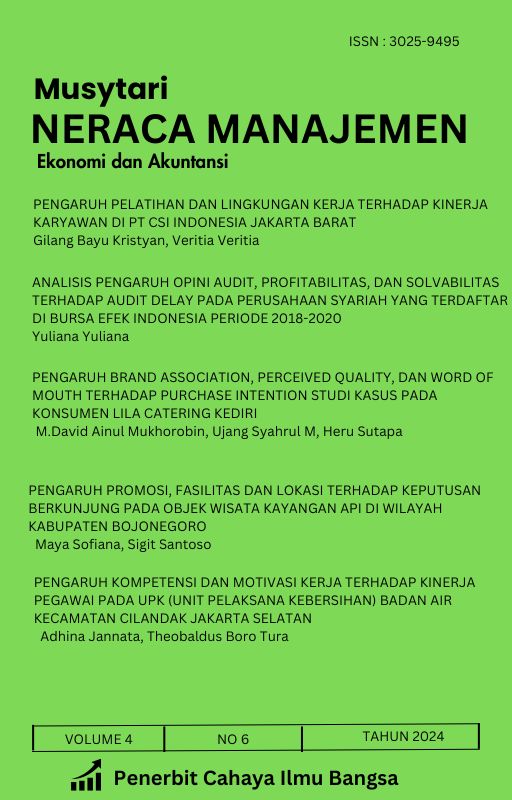STRATEGI PENGELOLAAN RUANG KOTA UNTUK MENDORONG AKTIVITAS EKONOMI : SUATU KAJIAN STUDI LITERATUR
Main Article Content
Abstract
The rapid growth of urban areas has increased the complexity of ur- ban spatial management, directly influencing the dynamics of eco- nomic activities. This study aims to examine various urban space management strategies that effectively stimulate urban economic growth through a literature review. The method employed is a litera- ture study analyzing scholarly sources from the last five years. The findings indicate that the integration of spatial planning, infrastruc- ture development, functional zoning, and participatory approaches from communities and stakeholders are key strategies for fostering economically productive urban spaces. Furthermore, adaptive spatial management responsive to social and technological changes is also a critical success factor. The study concludes that collaborative and sustainable approaches are essential in managing urban spaces to build inclusive and dynamic economic ecosystems.
Downloads
Article Details
Section

This work is licensed under a Creative Commons Attribution-NonCommercial-ShareAlike 4.0 International License.
How to Cite
References
Ababneh, A. (2023). Smart urban management of green space.
Journal of Design for Resilience in Architecture and Planning, 4, 339–353. doi:https://doi.org/10.47818/DRArch.2023.v4i3101
Abel, J. &. (2008). Human capital and economic activity in urban America. Regional Studies, 45, 1079–1090. doi:https://doi.org/10.2139/ssrn.1161184
Abramitzky, R. B. (2025). New data and insights in regional and urban economics (NBER Working Paper No. 33561).
National Bureau of Economic Research.
Afriyanto Fajar, N. T. (2024). Efektivitas perizinan penyediaan infrastruktur jaringan telekomunikasi: Komparasi di Kota Bekasi dan Sidoarjo. Binamulia Hukum, 13(1), 239–247. doi:https://doi.org/10.37893/jbh.v13i1.713
Akbari, T. M. (2024). Green open space management strategy in Serang City based on geographic information system technology. Jurnal Kebijakan Pembangunan Daerah,, 8(1), 1–13. doi:https://doi.org/10.56945/jkpd.v8i1.267
Alismail, A. A. (2025). Framework for improvement of national urban strategy model of Saudi Arabia by logical comparison with best practices in the world. Journal of Sustainable Research, 7(1). doi:https://doi.org/10.20900/jsr20250006
Almulhim, A. I. (2025). Building urban resilience through smart city planning: A systematic literature review. . Smart Cities, 8(1), 22. doi:https://doi.org/10.3390/smartcities8010022
Atzmanstorfer, K. B.-A.-P. (2025). Critical success factors of participatory community planning with geospatial digital participatory platforms. ISPRS International Journal of Geo-Information,, 14(4), 153. doi:https://doi.org/10.3390/ijgi14040153
Feng, J. &. (2023). Review of research on urban social space and sustainable development. Sustainability,, 15(22). doi:https://doi.org/10.3390/su152216130
Iamtrakul, P. C. (2025). A comprehensive exploration of urban spatial economic vitality through the application of the node-place model. . Journal of Urban Design,, 1 -15. doi:https://doi.org/10.1080/13574809.2025.2495913
Jacques, E. N. (2024). Smart city actions integrated into urban planning: Management of urban environments by thematic areas. Applied Sciences, 14, 3351. doi: https://doi.org/10.3390/app14083351
Li, G. W. (2022). Spatial planning implementation effectiveness: Review and research prospects. 11(8), 1279. doi: https://doi.org/10.3390/land11081279
Liu, B. W. (2018). Critical success factors for the management of public participation in urban renewal projects: Perspectives from governments and the public in China. Journal of Urban Planning and Development,, 3, 144. doi:https://doi.org/10.1061/(ASCE)UP.1943- 5444.0000467
Marchesani, F. &. (2024). Smart cities and economic development: Synergies among technology, social forces and female entrepreneurship. Journal of Small Business and Enterprise Development. doi:https://doi.org/10.1108/JSBED-01-2024-0012
Medeiros, E. &. (2020). Sustainable and integrated urban planning and governance in metropolitan and medium- sized cities. . Sustainability, 12(15). doi:https://doi.org/10.3390/su12155976
Meidodga, I. S. (2023). Pemanfaatan data geospasial dalam mewujudkan sistem informasi pertanahan multiguna bagi multipihak. Jurnal Widya Bhumi,, 3(1), 62 - 80.
Ng, M. K. (2022). Spatial planning for smart sustainable development? Planning Theory & Practice. Planning Theory & Practice , 23(5), 759–798. doi:https://doi.org/10.1080/14649357.2022.2139075
Niwa, Y. A. (2025). Managing for diverse publics: An innovative approach to urban public space management using AHP in Toyota City, Japan. Journal of Urban Management.
Advance online publication.
doi:https://doi.org/10.1016/j.jum.2025.04.009
Ochoa, W. A.-B. (2025). The theory of complexity and sustainable urban development: A systematic literature review. Sustainability,, 17(1), 3. doi:https://doi.org/10.3390/su17010003
Rezende, D. A. (2024). Strategic digital city: Multiple projects for sustainable urban management. Sustainability,,
16(13). doi: https://doi.org/10.3390/su16135450
Rikhotso, V. G. ( 175–183). Assessing the effects of road infrastructure on rural mobility and development: A bibliometric review. In M. Schrenk, T. Popovich, P. Zeile,
P. Elisei, C. Beyer, J. Ryser, & U. Trattnig (Eds.), . REAL CORP 2025 Proceedings , 2025.
Rubio, I. R.-L. (2025). Innovation and technology in urban transformation: An analysis of frameworks, stakeholders, and key performance indicators for the development of smart cities. SHS Web of Conferences,, 211. doi:https://doi.org/10.1051/shsconf/202521103002
Sáenz de Tejada, C. D. (2024). Urban planning, design and management approaches to building urban resilience: A rapid review of the evidence. Cities & Health, 8(5), 932– 955. doi: https://doi.org/10.1080/23748834.2024.2364491
Salem, M. R. (2025). Managing the urban–rural transition: A review of approaches and policies for peri-urban land use.. Journal of Urban Management. Advance online publication. doi: https://doi.org/10.1016/j.jum.2025.04.006
Tan, S. Y. (2020). Smart city governance in developing countries: A systematic literature review. . Sustainability,, 12(3), 899. doi:https://doi.org/10.3390/su12030899
Tiamiyu, B. &. (2023). Conceptual framework of adaptive social planning for sustainable urban transformation. Dalam A. Almusaed & A. Almssad (Eds.), . Sustainable regional planning (Bab). IntechOpen. doi:https://doi.org/10.5772/intechopen.109653
Turok, I. S. (2023). Rethinking urbanization and economic development: A synopsis. Environment and Urbanization , 35, 297–309.
doi:https://doi.org/10.1177/09562478231193829
Turok, I. S. (2023). Rethinking urbanization and economic development: A synopsis. . Environment and Urbanization,35, 297–309.
doi:https://doi.org/10.1177/09562478231193829
Wang, S. Z. (2024). Evaluating the impact of urban digital infrastructure on land use efficiency based on 279 cities in China. Land, . MDPI Land, 13(4), 404. doi: https://doi.org/10.3390/land13040404
Xiao, S. Z. (2024). Digital economy and urban economic resilience: The mediating role of technological innovation and entrepreneurial vitality. PLoS ONE, 19(6). doi: https://doi.org/10.1371/journal.pone.0303782
Yang, G. Z. (2023). A review on resilient cities research from the perspective of territorial spatial planning: A bibliometric analysis. Frontiers in Ecology and Evolution,, 11. doi:https://doi.org/10.3389/fevo.2023.
Yu, J. H. (2024). Towards more resilient cities—Analyzing the impact of new-type urbanization on urban resilience: Considering spatial spillover boundaries. . Sustainable Cities and Society, , 114. doi:https://doi.org/10.1016/j.scs.2024.10
Yudhistira, M. H. (2024). Unlocking urban potential. . Bulletin of Indonesian Economic Studies, 60(2), 129–159. doi:https://doi.org/10.1080/00074918.2024.2389492
Zheng, Y. L. (2023). Spatial planning of urban communities via deep reinforcement learning. . Nature Computational Science, , 3(9), 748–762.
